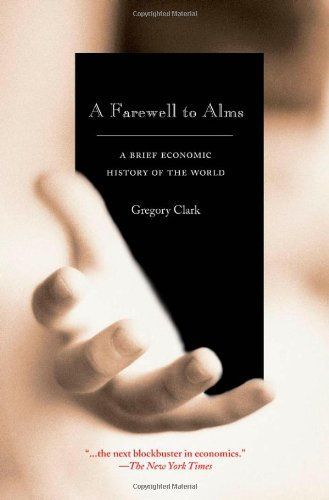
A Farewell to Alms A Brief Economic History of the World
"What caused the Industrial Revolution? Gregory Clark has a brilliant and fascinating explanation for this event which permanently changed the life of humankind after 100,000 years of stagnation."--George Akerlof, Nobel Laureate in Economics and Koshland Professor of Economics, University of California, Berkeley "This is a very important book. Gregory Clark argues that the Industrial Revolution was the gradual but inevitable result of a kind of natural selection during the harsh struggle for existence in the pre-industrial era, in which economically successful families were also more reproductively successful. They transmitted to their descendants, culturally and perhaps genetically, such productive attitudes as foresight, thrift, and devotion to hard work. This audacious thesis, which dismisses rival explanations in terms of prior ideological, technological, or institutional revolutions, will be debated by historians for many years to come."--Paul Seabright, author of "The Company of Strangers: A Natural History of Economic Life" "Challenging the prevailing wisdom that institutions explain why some societies become rich, Gregory Clark's "A Farewell to Alms" will appeal to a broad audience. I can think of nothing else like it."--Philip T. Hoffman, author of "Growth in a Traditional Society" "You may not always agree with Gregory Clark, but he will capture your attention, make you think, and make you reconsider. He is a provocative and imaginative scholar and a true original. As an economic historian, he engages with economists in general; as an economist, he is parsimonious with high-tech algebra and unnecessarily complex models. Occam would approve."--Cormac Grda, author of "Jewish Ireland in the Age of Joyce" "This should rapidly become a standard work on the history of economic development. It should start whole industries trying to test, refine, and refute its explanations. And Gregory Clark's views on the economic merits of imperialism and the fact that labor gained the most from industrialization will infuriate all the right people."--Eric L. Jones, author of "Cultures Merging" and "The European Miracle" "While many books on the Industrial Revolution tend to focus narrowly either on the event itself, or on one explanation for it, Gregory Clark does neither. He takes an extremely long-run view, covering significant periods before and after the Industrial Revolution, without getting bogged down in long or detailed exposition. This is an extremely important contribution to the subject."--Clifford Bekar, Lewis and Clark College
Reviews
Andrew Louis@hyfen